
Magento PIM Integration: Choosing the Best PIM Systems
Want to deliver seamless omnichannel experiences to your customers? Magento PIM integration is your solution. It is a software solution designed to help helps manage and organize product information. This guide shows how PIM streamlines your Magento store processes and ensures data accuracy.
Key Takeaways
-
Discover how Magento 2 PIM centralizes product data across various sales and marketing channels.
-
Explore the reasons to integrate a PIM with your Magento 2 account.
-
Explore how businesses can significantly benefit from implementing Magento PIM.
-
Learn about the requirements for successfully integrating a PIM with Magento.
-
Discover top PIM systems for Magento 2 integration with unique features and benefits.
-
Learn how to select the right PIM system for your Magento 2 ecommerce store.
What are Magento 2 Product Information Management Systems?
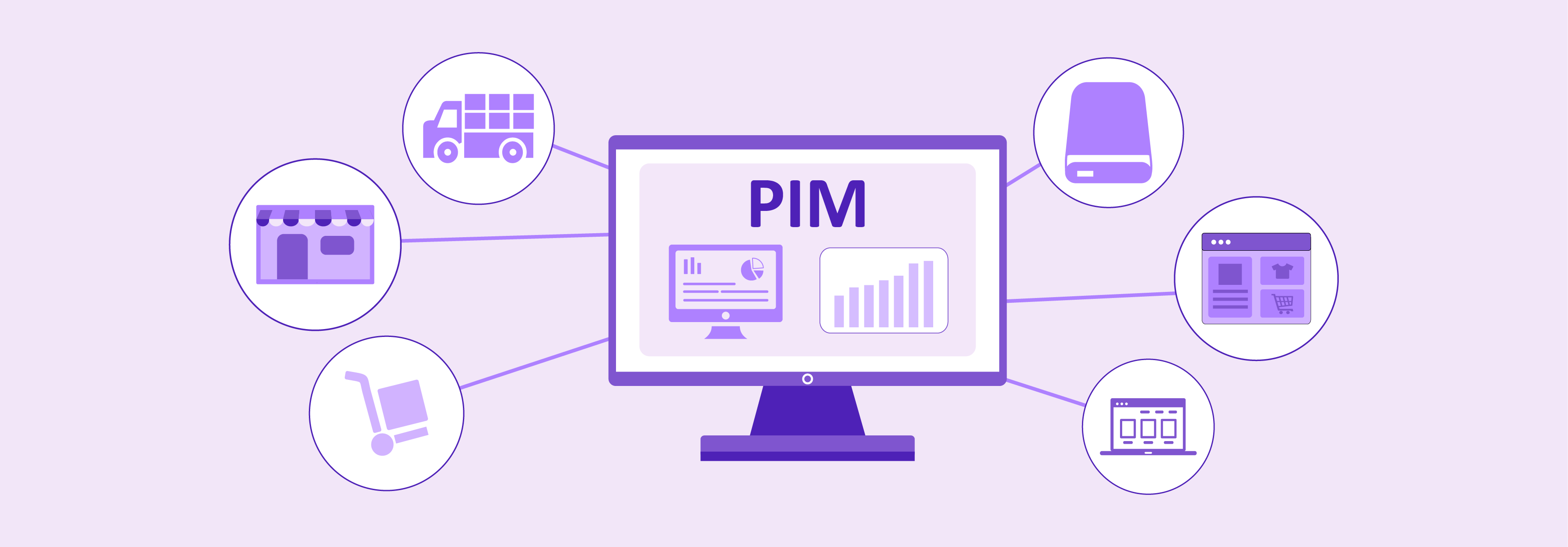
Magento 2 PIM is a software system for importing and exporting product-related information.
Magento PIM is integrated within a company’s data repository. PIM tools centralize product data and manage accurate information across various channels.
PIM systems are valuable for eCommerce businesses that undergo frequent changes in their:
-
Sales strategies, and
-
Marketing messages
Businesses using Magento PIM systems can efficiently create categories. It ensures accurate data transfer between departments. It also helps maintain consistency and synchronization of information.
Data stored within PIM improves:
-
Time-to-market
-
Sales, and
Why Integrate a PIM With Your Magento 2 Account?
Managing a CMS and a Magento account often presents a challenge due to the need for a centralized. PIM platform simplifies integration with Magento and other systems.
Centralized data can be distributed across:
-
Online stores
-
Brand websites
-
Marketplaces
-
Design systems
-
Supply networks
It provides error-free product data syndication across omni or multichannel strategies. Cloud-based PIM systems offer flexibility, allowing access from any device or location.
Opt for a PIM with a preconfigured Magento connector for smooth implementation and benefits.
Key Benefits of Magento 2 PIM Integration
1. Omnichannel Experiences
Brands aim for consistency across various sales channels. PIM simplifies managing product content for each channel. Administrators can organize assets into catalogs, facilitating targeted campaigns. It enables product marketers to make on-demand changes and launch new content quickly.
2. Personalization
Tailoring sales materials to individual prospects drives engagement and Magento conversions. Magento 2 PIM provides sales reps with easy access to approved product data. It enables them to tailor proposals using approved product information. They can select templates, products, and pricing structures suited to individual prospects.
3. Reliable Data
Magento 2 PIM ensures reliable data by:
-
Categorizing
-
Deduplicating, and
-
Regularly updating product information
PIM administrators prioritize data sources. They refresh information to minimize the risk of using outdated or inaccurate data for offers.
4. Product Information
PIM shows all data across business systems, maintaining quality and accuracy. By centralizing product information, businesses enhance sales and marketing teams. It also facilitates catalog growth without cluttering the ERP system with unnecessary SKUs.
5. Improved Marketing Strategies
Magento 2 PIM enables marketers to combine product data. It helps develop more effective commercial campaigns. They can use this targeted information to create detailed messaging and personalized campaigns.
With access to various digital media, marketing teams can conduct A/B testing. It helps Magento store owners determine the most effective combinations of:
-
Images
-
Videos, and
-
Documentation
6. Localized information
Companies operating locally, regionally, and globally require product information. It should be tailored to specific locations. Magento 2 PIM systems accommodate:
- Multilingual content
- Regional currency systems, and
- Other localization features
7. Taxonomy
PIM software catalogs variations, relationships, and categories of a company’s product structure. Businesses can improve cross-selling and upselling opportunities by managing taxonomy.
Who Can Benefit From Implementing Magento PIM?
Ecommerce stores selling across various channels can benefit from a PIM system. PIM empowers sales teams by providing access to accurate product data and materials. It enhances their efficiency in serving prospects and clients.
Ecommerce managers leverage PIM to:
-
Monitor interactions with product data
-
Optimize Magento conversion rates, and
-
Enhance personalization strategies
Marketers can efficiently collaborate with translation agencies. It helps them translate product information. It also results in market expansion into new geographical regions.
Requirements for Integrating a PIM with Magento

1. Technical Expertise
Ensure you have a dedicated Magento expert within your technical team. This individual should undergo the necessary training to understand the Magento platform. It aids in maintenance and troubleshooting processes. It also helps enhance overall efficiency.
2. Data Structure Planning
Select an appropriate product data structure. Define product attributes and fields for products and variants. Consider the number of channels to be integrated with the PIM. A well-defined data structure ensures seamless integration and accurate data management across platforms.
3. Key Data Monitoring
Monitor all essential data to be connected to Magento. It includes:
-
Simple products
-
Configurable products, and
-
Marketing materials such as digital assets
Keeping track of key data enables effective product information management.
4. Magento Hosting
Choose a reliable Magento hosting provider to ensure optimal performance and reliability. It supports the integration of a PIM system with Magento. It also ensures the smooth operation of your eCommerce platform.
Top PIM Systems for Magento 2 Integration
1. Akeneo PIM
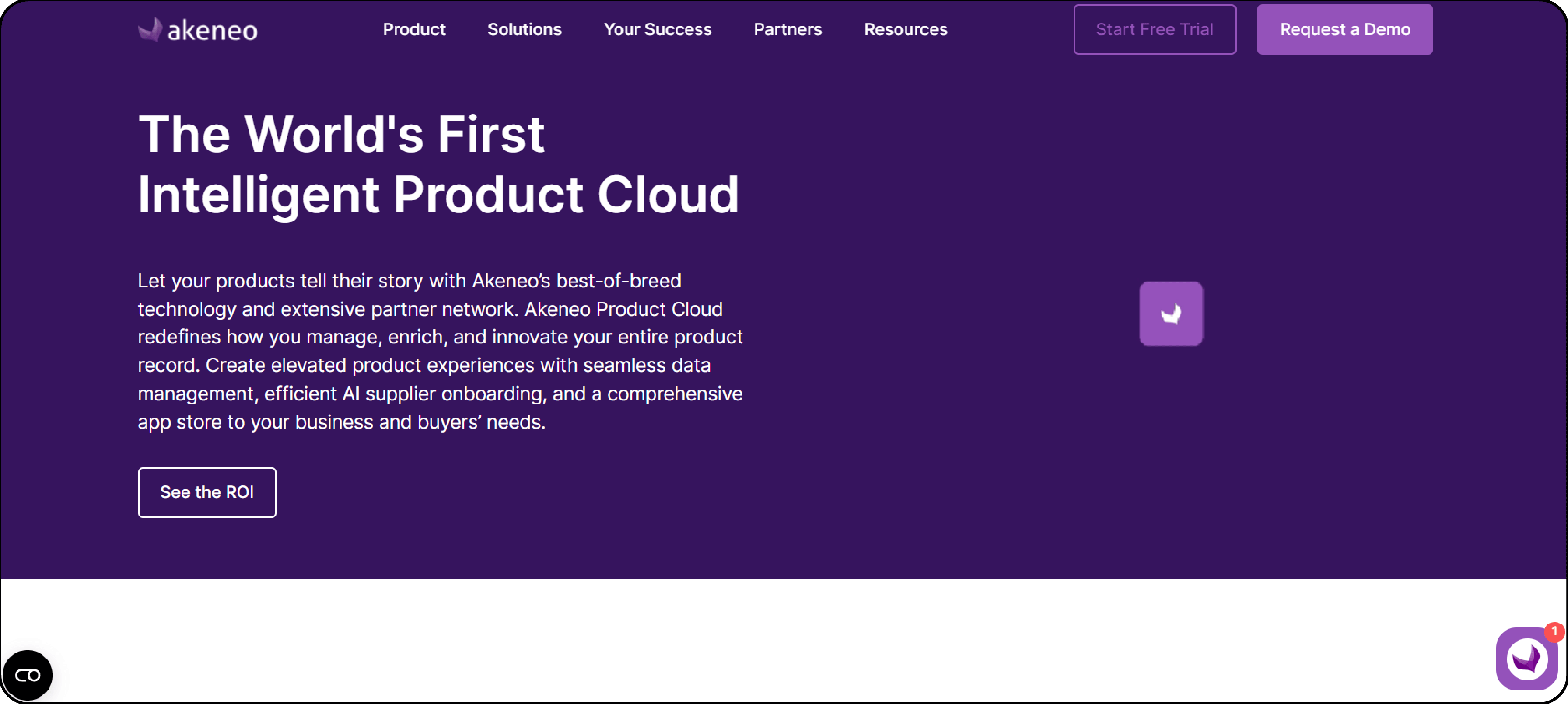
Akeneo PIM is an open-source product information management system. It is a centralized platform to collect, manage, enrich, and distribute product data across sales channels. It offers workflow management, translation management, and data quality insights.
Features:
-
Open-source and community-driven.
-
User-friendly interface.
-
Strong data enrichment features like product classifications, taxonomies, and variations.
-
Active developer community and support available.
2. Pimcore

Pimcore is an open-source platform for managing data and customer experiences. It combines PIM/MDM, DAM, CDP, CMS, and commerce functionality into a single integrated software stack.
Features:
-
Open-source with a commercial enterprise edition.
-
Combines PIM, DAM (Digital Asset Management), and CMS functionalities.
-
Automates tasks and ensures data quality.
-
Multi-language and multi-currency support.
3. Bluestone PIM
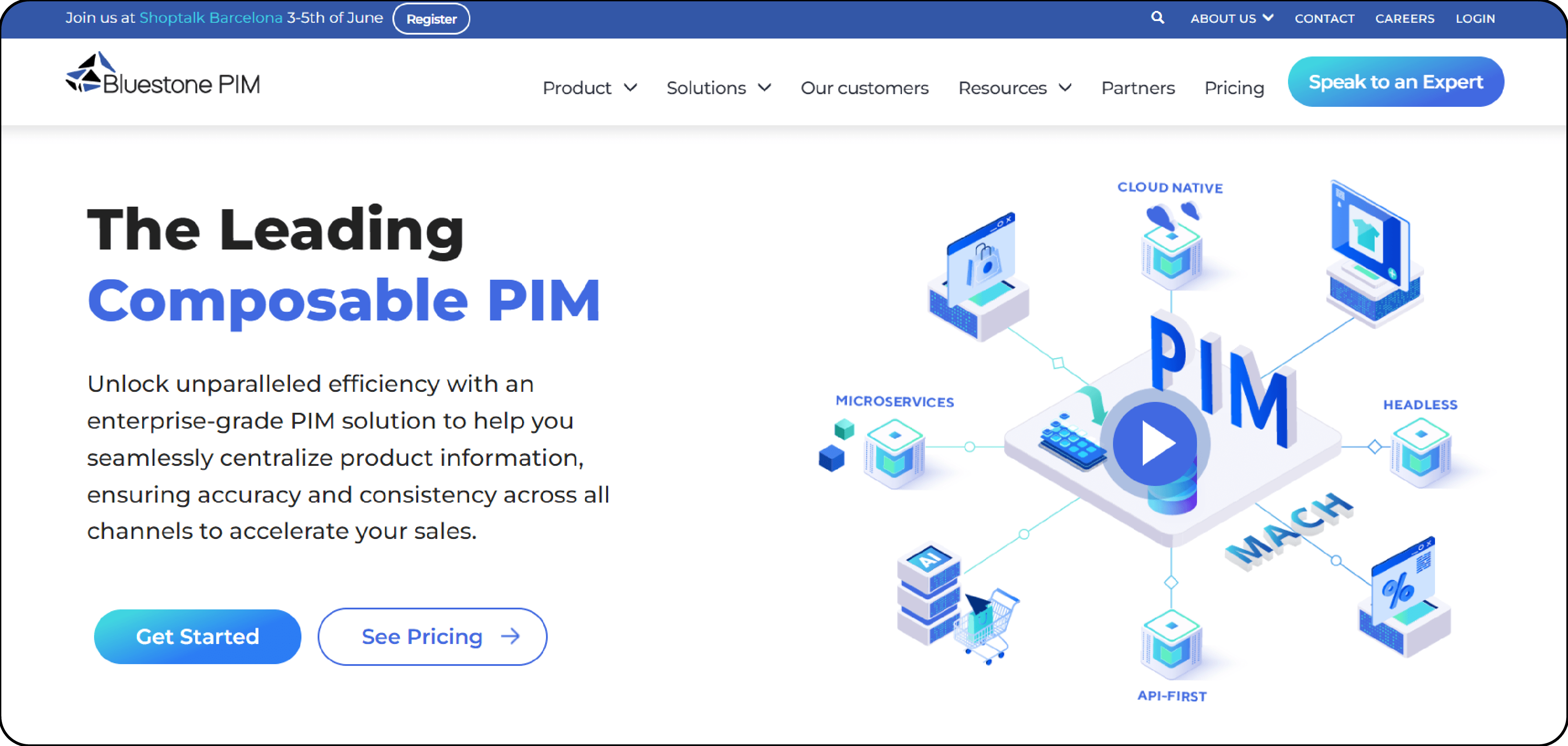
Bluestone PIM is an enterprise SaaS solution for product information management. It enables collaboration on product data across teams and offers seamless ecommerce integration.
Features:
-
Cloud-based and MACH-certified.
-
Seamless integrations with various systems, including Magento 2.
-
Tools for data validation and consistency.
-
Supports omnichannel commerce strategies.
4. inRiver PIM
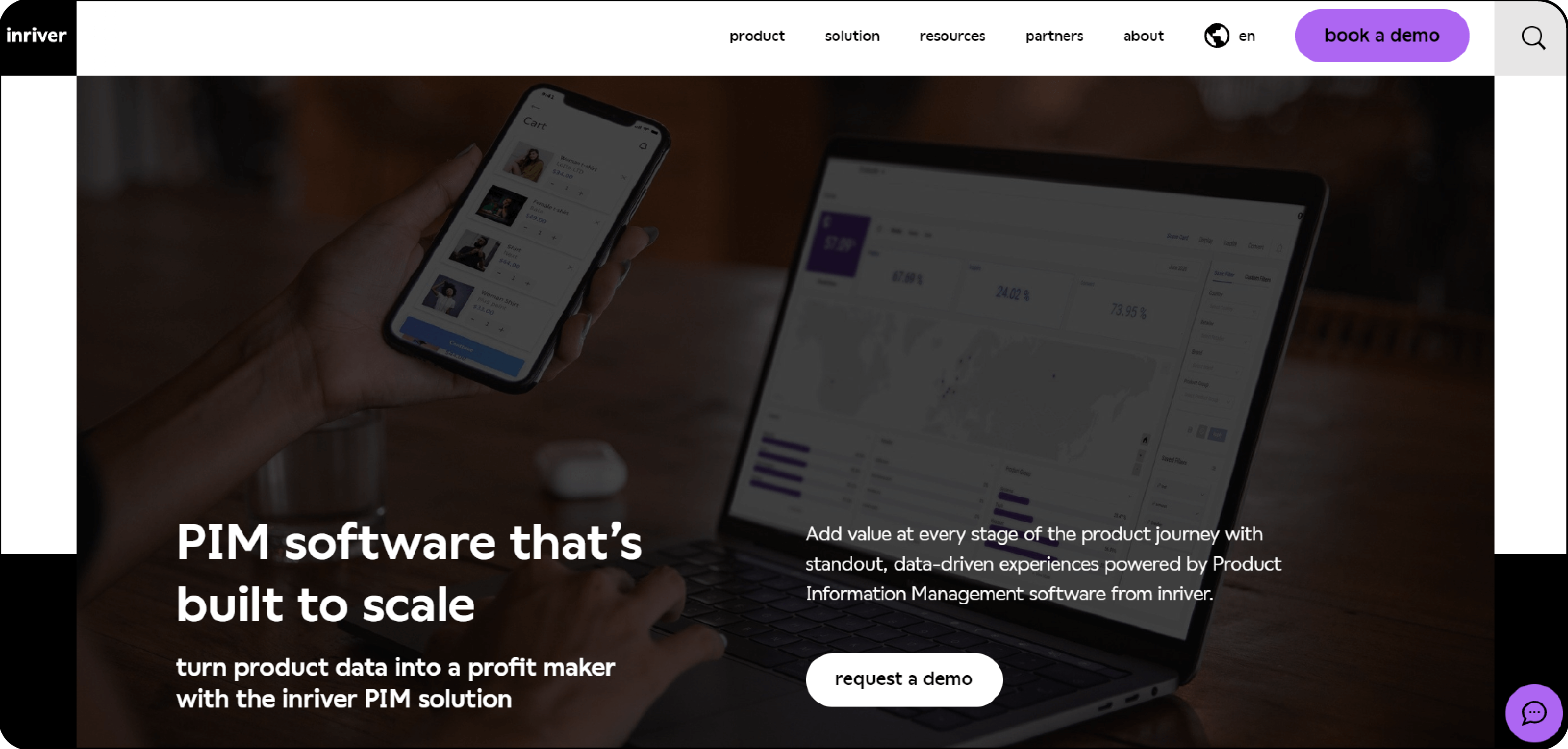
inRiver PIM provides a centralized SaaS platform. It helps manage, organize, enrich, and distribute product information across channels.
Features:
-
Enterprise-grade solution for complex product data needs.
-
Supports multiple languages, currencies, and regulatory requirements.
-
Advanced analytics and reporting.
-
Strong partner ecosystem.
5. FlexiPIM
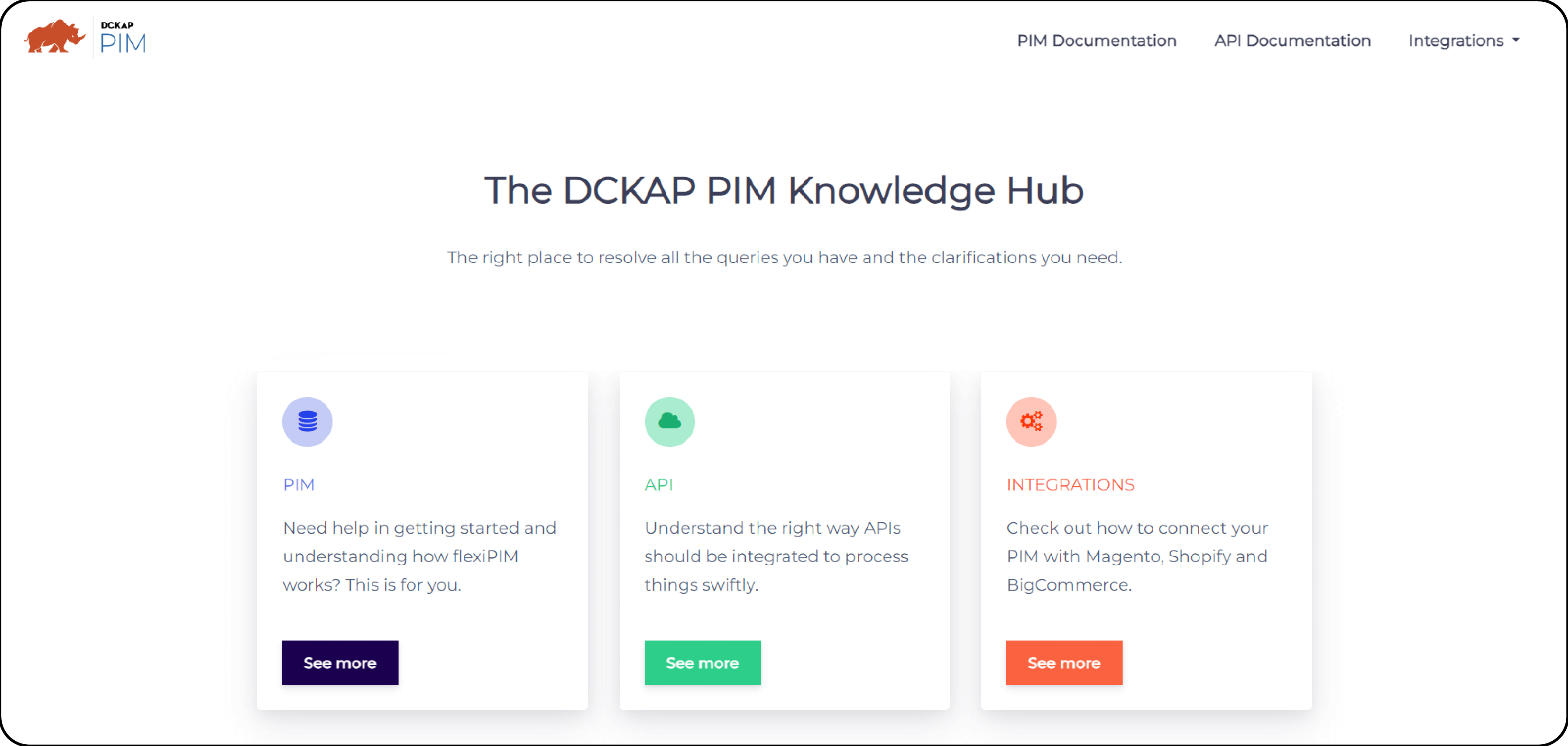
FlexiPIM is designed to simplify and ease managing product data. It allows users to set up a catalog quickly with flexible attributes.
Features:
-
Cloud-based for B2B commerce.
-
Simplifies complex product data management tasks.
-
Multi-channel and multi-language support.
-
Affordable pricing.
How to Select the Right PIM System
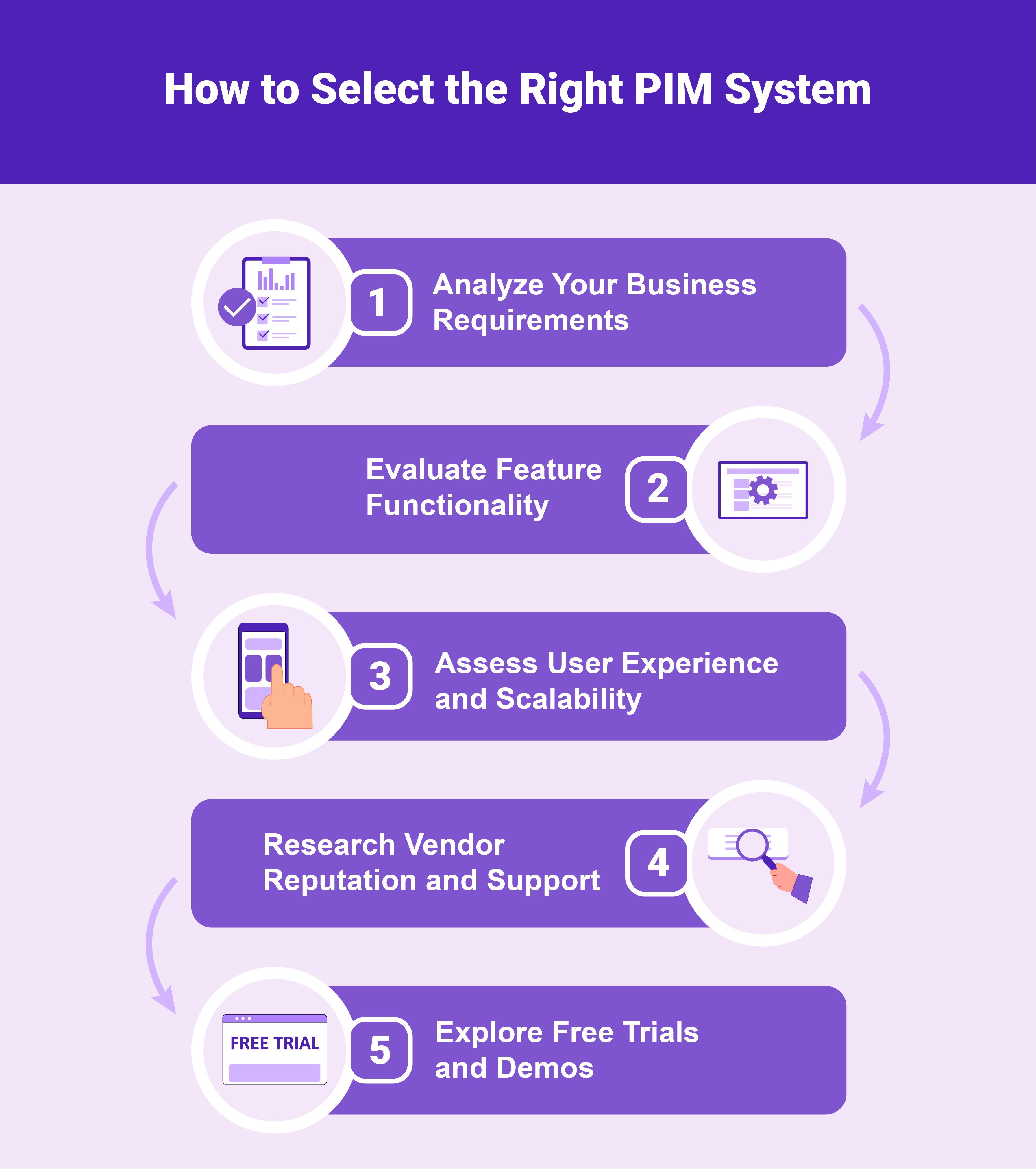
1. Analyze Your Business Requirements
-
Catalog size and complexity: Evaluate catalog size and complexity to understand the volume and nature of product data.
-
Integration needs: Assess integration needs to ensure compatibility with Magento 2.
-
Budget: Define the budget and explore pricing models PIM vendors offer.
2. Evaluate Feature Functionality
-
Data enrichment capabilities: Look for support for classifications, taxonomies, variations, and digital assets.
-
Workflow management: Assess workflow tools like data validation, approval processes, and publishing.
-
Multi-channel and multi-language support: Consider multi-channel and multi-language support. It helps cater to international markets.
3. Assess User Experience and Scalability
-
User interface: Ensure the user interface is intuitive and user-friendly. It should be for both technical and non-technical team members.
-
Scalability: Choose a scalable system to accommodate future growth. It should evolve product information needs.
4. Research Vendor Reputation and Support
-
Vendor track record: Investigate the vendor’s track record and expertise in your industry and with Magento 2 integrations.
-
Customer support: Evaluate the level of customer support provided. It includes training, documentation, and ongoing assistance.
5. Explore Free Trials and Demos
-
Hands-on experience: Utilize free trials and demo opportunities. It helps gain hands-on experience with the PIM system’s functionalities and user interface.
-
Consult with experts: Consult with Magento and PIM specialists for tailored recommendations.
FAQs
1. How does integrating Magento PIM benefit inventory management?
Integrating Magento PIM enhances inventory management. It centralizes product data, ensuring accurate information across various sales channels. It facilitates efficient handling of product catalogs and synchronization of data between departments.
2. Can Magento PIM solutions streamline the import and export processes?
Yes, Magento PIM solutions streamline import and export processes. It provides a centralized platform for managing product information. It ensures efficient data transfer and reduces Magento errors. It also improves the overall accuracy of product descriptions and prices.
3. How does Magento 2 PIM contribute to improving the product experience?
Magento 2 PIM enables enriched, optimized, and centralized data creation. This data can be efficiently distributed across online stores, marketplaces, and supply networks. It ensures consistency and enhances customer experiences.
4. What role do connectors play in successful Magento 2 PIM integration?
Connectors establish a seamless connection between the PIM platform and the Magento store. It also ensures smooth implementation and ongoing benefits. It manages product catalogs and prices.
5. How can Magento PIM systems assist in managing product data across various categories?
Magento PIM systems assist in managing product data across various categories. It centralizes information and facilitates the creation of categories. It ensures consistency, synchronization, and efficient data transfer between different departments. It contributes to improved time-to-market and increased sales.
6. What considerations are essential for selecting the right PIM system for Magento integration?
When selecting a PIM system for Magento integration, it’s important to analyze business requirements. You should evaluate feature functionality. It includes data enrichment and workflow management. Also, research vendor reputation and explore free trials and demos. These considerations ensure a well-informed decision for effective PIM integration.
7. How does Magento 2 PIM ensure reliable product information?
Magento 2 PIM supports relationships with suppliers by providing a centralized data repository. It ensures reliable product information through categorization, deduplication, and regular updates.
Summary
Magento PIM systems helps complex product relationships, SKUs, or an omnichannel selling strategy. By integrating a PIM system with your Magento store, you can:
-
Centralize and manage product data across various sales channels.
-
Ensure data accuracy, consistency, and synchronization.
-
Deliver omnichannel experiences and personalization.
-
Improve product information and marketing strategies.
-
Manage localized information and taxonomy.
Explore optimal Magento server hosting solutions to ensure the smooth integration of PIM.




